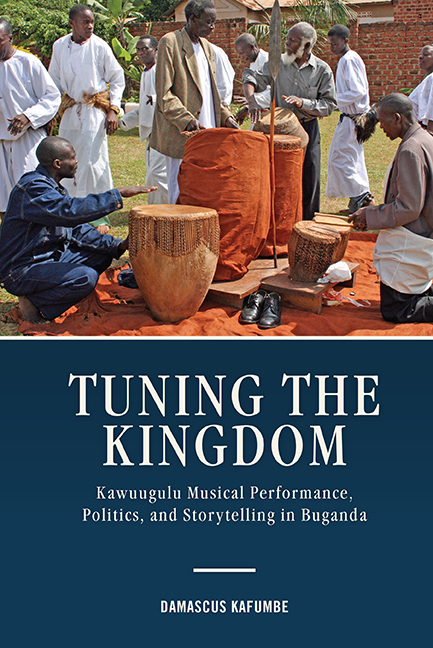Book contents
- Frontmatter
- Dedication
- Contents
- List of Illustrations
- Acknowledgments
- Note on Translation, Transliteration, and Orthography
- Note on the Musical Examples
- Preface: A Kingdom in and out of Tune
- Introduction: Kawuugulu Musical Performance, Politics, and Storytelling
- 1 The Kawuugulu Clan-Royal Music and Dance Ensemble
- 2 Kawuugulu and Intra-Clan Politics
- 3 Kawuugulu and Royal Politics
- 4 Kawuugulu and Inter-Clan Politics
- 5 Conclusion: A Performative Constitution
- Appendix A Glossary
- Appendix B Author Interviews
- Notes
- Works Cited
- Index
Introduction: Kawuugulu Musical Performance, Politics, and Storytelling
Published online by Cambridge University Press: 09 June 2021
- Frontmatter
- Dedication
- Contents
- List of Illustrations
- Acknowledgments
- Note on Translation, Transliteration, and Orthography
- Note on the Musical Examples
- Preface: A Kingdom in and out of Tune
- Introduction: Kawuugulu Musical Performance, Politics, and Storytelling
- 1 The Kawuugulu Clan-Royal Music and Dance Ensemble
- 2 Kawuugulu and Intra-Clan Politics
- 3 Kawuugulu and Royal Politics
- 4 Kawuugulu and Inter-Clan Politics
- 5 Conclusion: A Performative Constitution
- Appendix A Glossary
- Appendix B Author Interviews
- Notes
- Works Cited
- Index
Summary
Kiganda Politics and Kawuugulu Musical Performance
The Baganda are organized into over fifty patrilineal clans (bika, sing. kika). These clans are exogamous in the sense that members marry outside of their clans. Each clan traces its origins to a forefather called jjajja w’ekika, “grandfather of the clan,” who may not have been one of the clan's original leaders. Also, every clan has a leader called mukulu w’ekika, “head of the clan”; in addition, every clan head has a unique title name. Clan heads run an administrative structure that all clans share. The structure comprises different hierarchical levels (see figure I.1), each of which contains several lineages of people, with independent leaders.
These lineages allow clan members to manage their growing numbers. For instance, when the population of a clan level grows large enough to require multiple leaders, its members may approach the clan head to request approval to create one or more additional lineages. Because the Baganda are a patrilineal group, they have primary membership in their fathers’ clans and secondary membership in their mothers’ or matrilineal clans. Many people, however, acquire secondary membership in clans through blood brotherhood (mukago), marriage (bufumbo), or kinship between ancestors of different clans. Every clan has a primary totem (muziro) and a secondary totem (kabbiro). A totem may be a plant, an animal, a part of either one, or a nonliving substance such as water from a special source or an inanimate object such as an awl (lukato). Clans take their names from their primary totems. It is taboo to eat a totemic animal and plant, consume a totemic substance, or use a totemic object, in part because many consider totems as kin. Clans discussed in this book include those with an animal as the primary totem and those with a plant as the primary totem:
Clans with an Animal as Primary Totem
Ffumbe (Civet Cat) Clan
Lugave (Pangolin) Clan
Mbogo (Buffalo) Clan
Mmamba (Lungfish) Clan
Mpeewo (Oribi) Clan
Ndiga (Sheep) Clan
Ngabi (Bushbuck) Clan
Ngeye (Colobus Monkey) Clan
Ngo (Leopard) Clan
Njovu (Elephant) Clan
Nkima (Monkey) Clan
Nkula (Rhinoceros) Clan
Nvubu (Hippopotamus) Clan
- Type
- Chapter
- Information
- Tuning the KingdomKawuugulu Musical Performance, Politics, and Storytelling in Buganda, pp. 1 - 24Publisher: Boydell & BrewerPrint publication year: 2018

